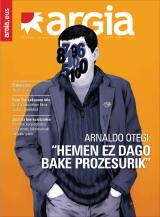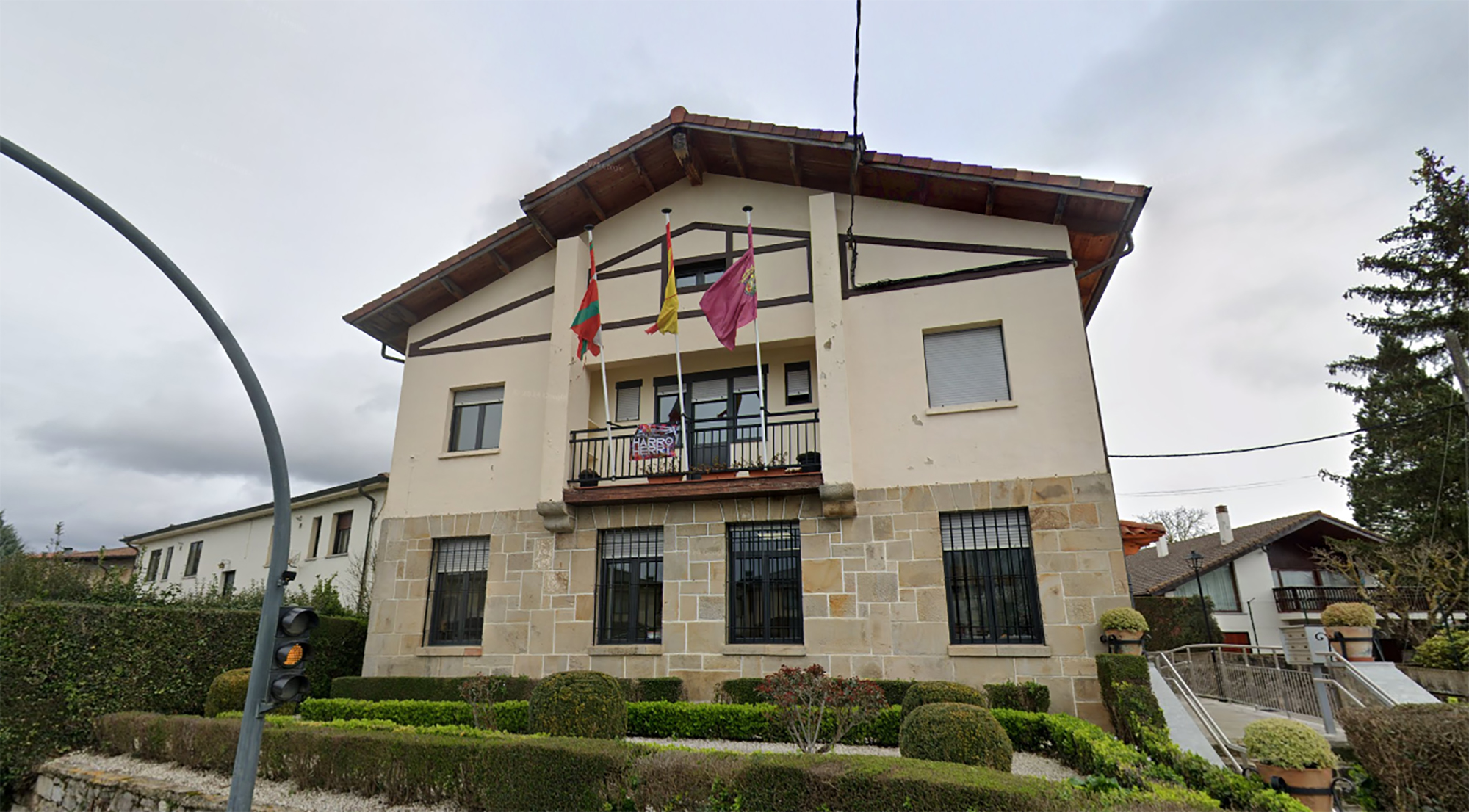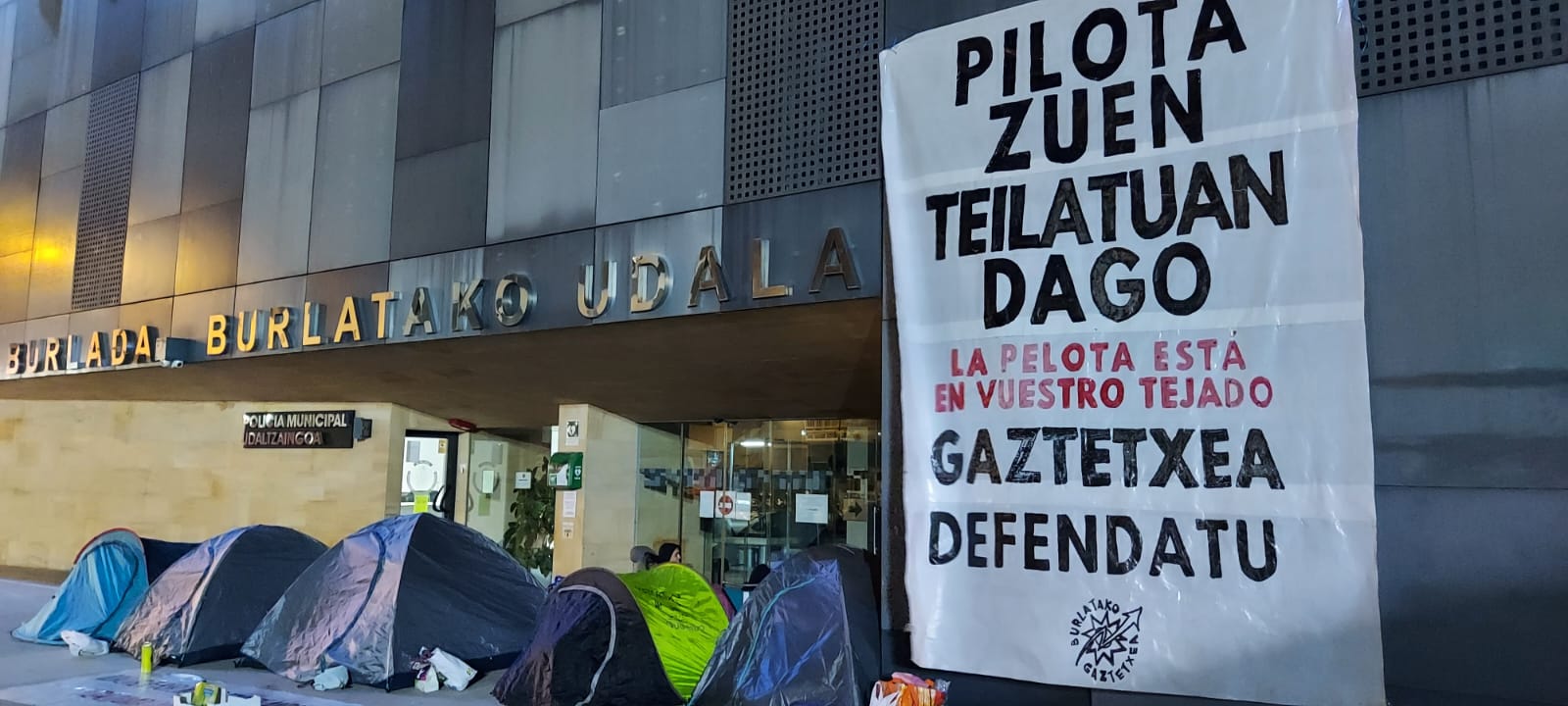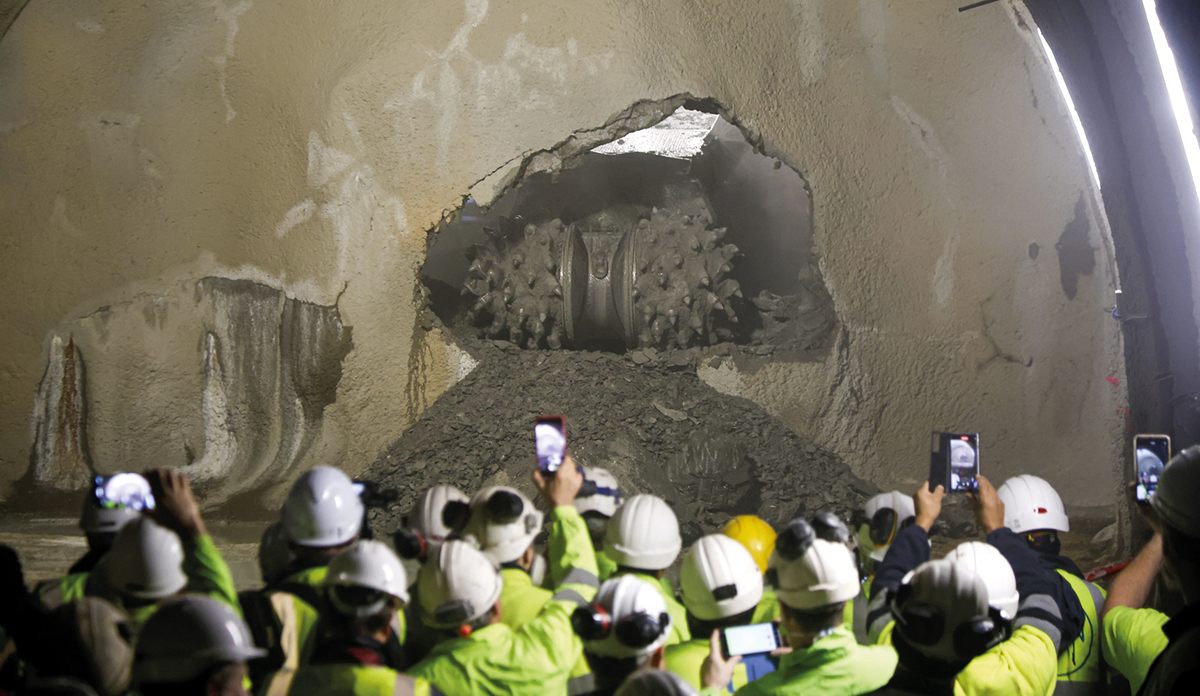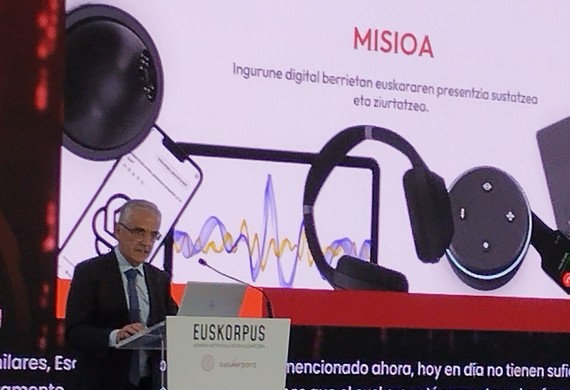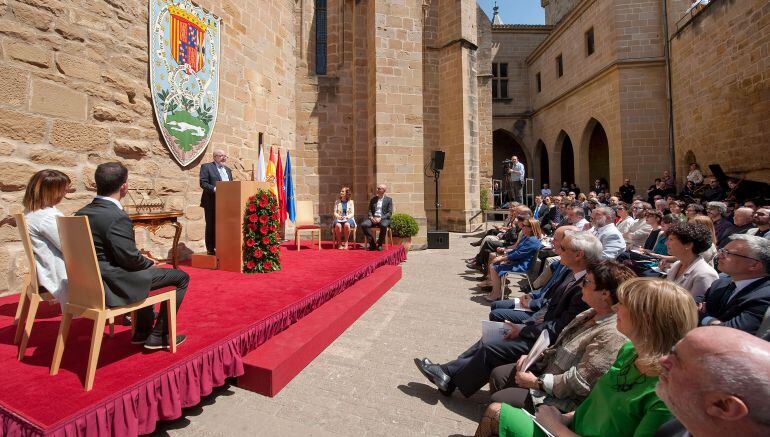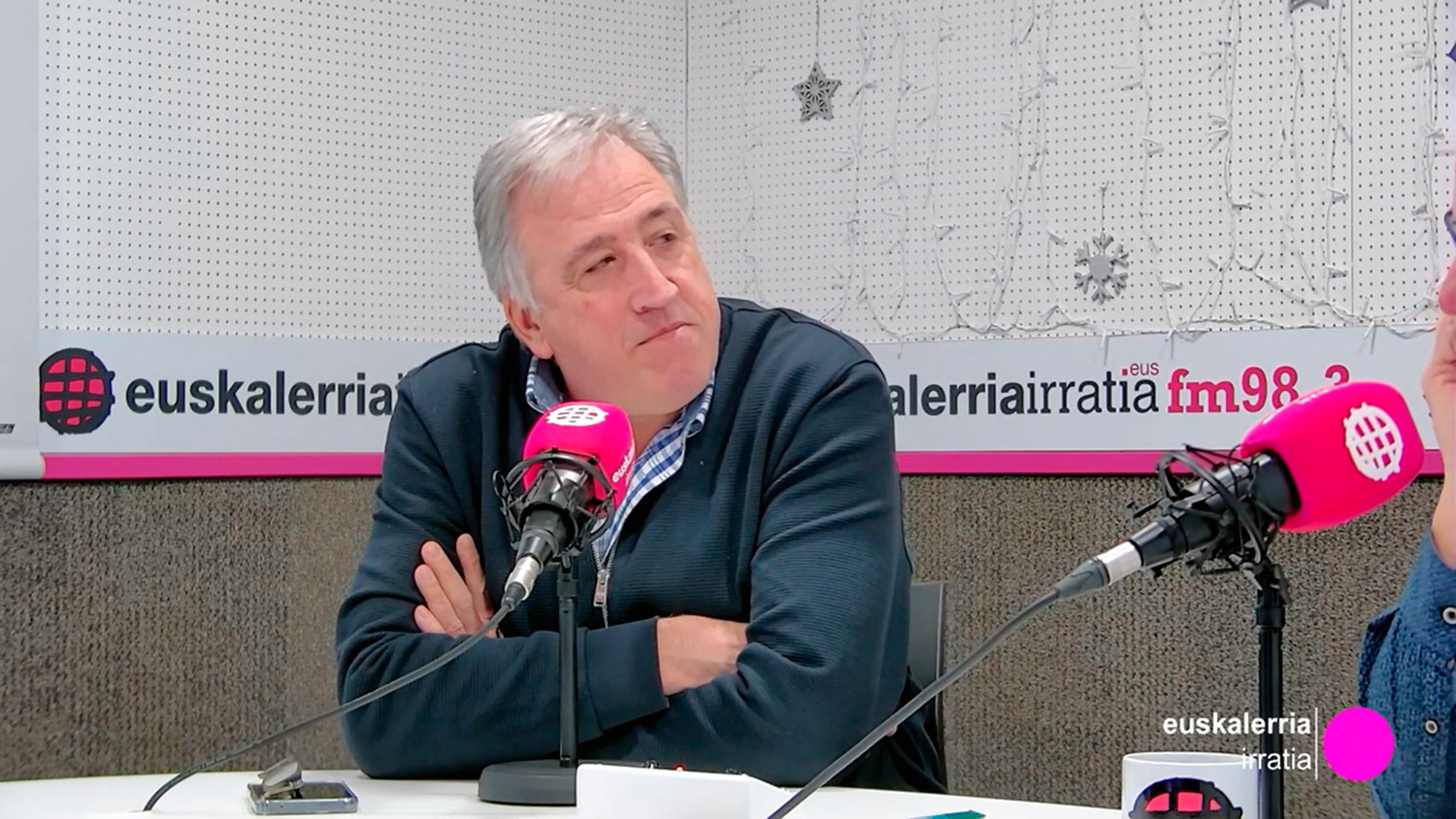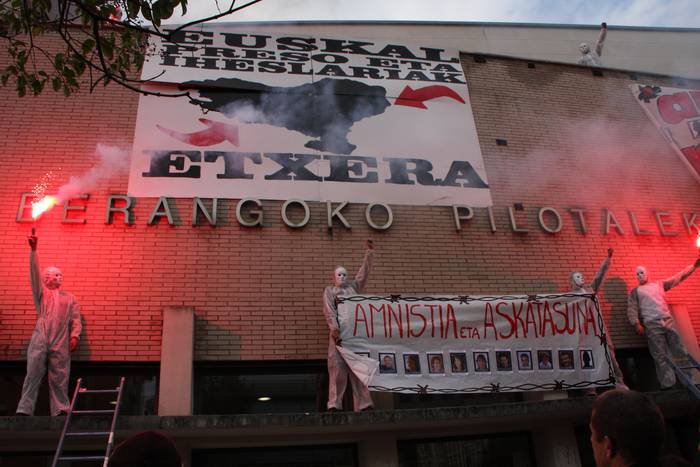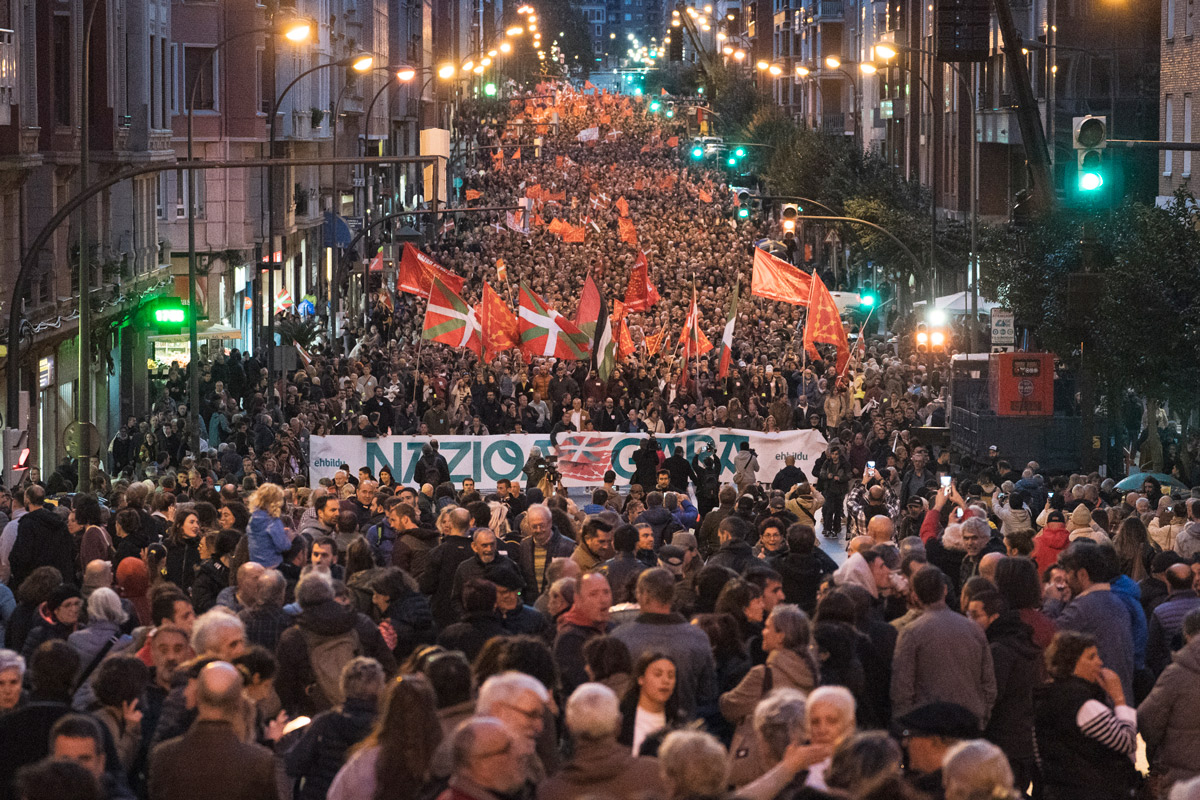"It's essential to be with them and not to talk about victims."
- We have published an extensive interview with Arnaldo Otegi. In an extensive interview with Gemma García, journalist of La Directa in Catalonia, Otegi, a prisoner since 2009, has reflected in depth on various current issues.
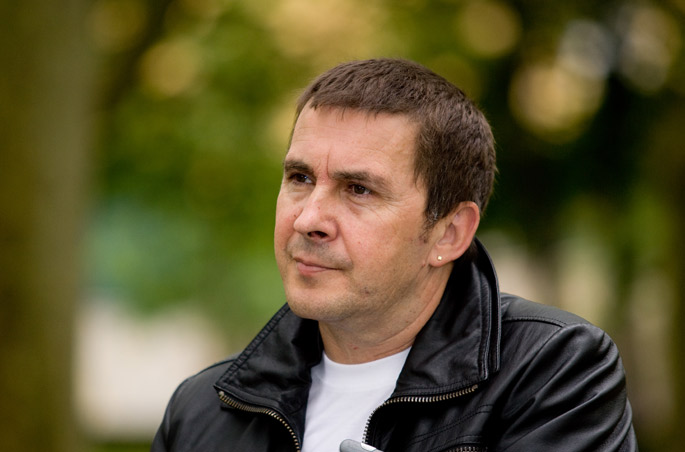
Dialogue is a conversation between people, a discursive form that is characterized by the exchange of ideas, although it is often about opposing ideas. Dialogue is an essential tool for resolving any conflict, as Arnaldo Otegi, Rafa Díez, Miren Zabaleta, Sonia Jacinto and Arkaitz Rodríguez were arrested in October 2009 in the so-called Bateragune case and sentenced in September 2011. They committed themselves to peace at the time when it was most needed, when no one believed, and that determined commitment, the anti-terrorist decadence that came under the slogan ETA gives, and the accusation of trying to rebuild the Batasuna National Bureau, led Otegi to prison. The unilateral peace strategy was resolved on 20 October 2011, four years ago, when ETA announced the final cessation of its military activity.
In this sense, dialogue should be the basis of any dialogue, but in this case, the imprisonment of Arnaldo Otegi, a historical militant of the Abertzale Left and current secretary general of Sortu, impedes dialogue. The questions of this interview left on August 12 to the prison in Logroño, and the return trip took place on September 25. In total, twelve manuscript pages of ten square meters of punishment cell, in which he spends more than fifteen hours a day reading and learning.
After six years between the barrotes, on October 11, Zabaleta, Jacinto and Rodríguez will be released. Díez will still have to wait. Next April, Otegi will have a double appointment with freedom: the freedom of himself and the freedom of his people. Leaving Logroño behind, he will spend more than fourteen years in jail, but his ideas have remained intact.
The criminal law of the enemy: the sentence that condemns you does not argue what you have done, but who you are and what you have not done. Anyway, why do you think you are a prisoner?
The conviction is based solely on political considerations. It is a verbatim ruling. The final provision – condemnation – was first clarified and an attempt was then made to argue legally. Our most serious crime was the approach and the achievement of the disappearance of ETA’s armed violence from the Basque political equation. In other words, our crime was to move from the boxing ring to the chessboard to confrontation with the state. Given that some Civil Guard operation has been baptized with chess comparisons, it is clear that the state wants to play chess with boxing gloves. And that's impossible.
What prison regime are you in and what is a regular day in jail?
The official prison is summed up in three words: noise, routine and arbitrariness. But there is also the prison that we build every day for the prisoners, in this case the political prisoners. Our life is between books of reading or learning, in the framework of sport and political debates. In Logroño, officially and by normative demands, we spend fifteen hours in our punishment cell of ten square meters, but in our case they are more, by their own will, as we deny hours of different courtyards to be able to study or read.
What has been the cruellest time that has passed inside the prison? And during his absence?
In recent years my mother-in-law and friends have left me, but undoubtedly the myocardium suffered by my father, who was healed later, and above all, has been the death of my mother. In the farewell letter I wrote publicly, I said: when my mother was six years old, she had to meet her brother in El Dueso prison today in the same prison, for the same reason as me, colleague Rafa Díez is in prison. Eighty years later, our mother died without seeing me free, and she had longed for it all her life without seeing her: the freedom of all prisoners. That may be the good summary of the democratic history of the Spanish State. Outside prison I have also experienced personal painful moments, the death of friends and colleagues. As for the political sphere, the arrests in Madrid after 9/11 and the consequences of death and frustration after every failed negotiating process, the suffering and pain of all sectors of Basque and Spanish society have been the most difficult moments for me.
The State has insisted that without violence everything would be possible. But he has responded to the new Basque scenario with restraint and repressive logic, except for the approval of the legalization of EH Bildu. What are the political and determining foundations that lead to this position?
First of all a small specification: The legalization of EH Bildu was by no means a concession, simply the correlations of strength with the change of strategy made it impossible for the State to make any other decision. Having said that, I am convinced that Bildu’s illegalization was on the pp agenda: The final cessation of ETA’s armed struggle and the suggestions of the international community led to the dismantling of these plans. The essence of this attitude lies in something that the State carries within its political and cultural DNA: in the absence of a democratic culture, there is only the threat and the force, excellent for the boxing ring. But in the chess game, the gloves are out of place, and if you put them in your anti-democratic temperament, it's clear. Thus, everything is possible without violence, the motto has become clear what it really was: a great lie, a fallacy.
Political jails continue, such as those of young Basques accused of belonging to Segi, such as the closure of the Herriko Tabernas or the dispersal, among others. Why does the Spanish government not move parts?
With all these repressive initiatives, the government wants to revolutionize the chess board and artificially recreate the boxing ring. It aims to extend the shadow and logic of the previous scenario to the maximum. In fact, he believes that he has alternatives in the anti-terrorist logic (ring), while on the current stage (chess) he does not. So when you no longer have a boxer in front of you, you artificially create it, stopping, incarcerating and manipulating information. Simply because it has no argument, no talent to play on the new stage. It is simply because it has no alternative. Therefore, it tries to gain time, because it is afraid, and its biggest concern is that Euskal Herria start the path that Catalonia has taken.
Since 1998, the Spanish State has developed a real anti-terrorist laboratory under the excuse that everything is ETA. What benefits has it gained and continues to derive as a result of that strategy?
It was an ideal context for the State. It built a global strategy that allowed it to criminalize independence and the continued attempt to reduce political conflict to the anti-terrorist issue. In addition, it guaranteed him great impunity for the international community, at its repressive level. And what was the fundamental reason behind this global repressive strategy? The existence of ETA’s armed violence was an extraordinary alibi. And what did we do? We left them without an alibi. Is there still any doubt about the real reasons for our imprisonment?
What scenarios does Arnaldo Otegi envisage to end the blockade in the future?
The experience of time has led me to the following conclusion: For the State, the solution to the agreed conflict that recognizes the national identity of Euskal Herria or Catalonia and its right to decide is, strategically, as unacceptable as the independence of our nations. It is my conviction that we must take care to implement a dynamic of our own that will guide us to build our own State, rather than to develop very complicated strategies that will move the positions of the State. If our liberation strategies are necessarily based on the achievement of alliances with the State, there will be no agreement and there will be no liberation. Does that mean that we reject all kinds of agreements? By no means. It is about drawing our own roadmap, without worrying about reaching agreements or not.
In the introduction he has just published in Pepe Mujica’s biography, he talks about revolutionary ethics and suffering. What studies can be drawn from the conflict in the Basque Country?
I believe that revolutionaries should anchor our position in a principle of revolutionary ethics. A revolution, if there is a minimal possibility, must choose between the lines of itself or its adversary the path that entails the least cost – in the human sense –.
How have Basque society been politically, socially and culturally marked by long-term conflicts? How are the links rebuilt?
The social and political life of our people is marked by violence and confrontation. In the last two centuries, in our people there has not been a single generation that has not known or suffered the attacks of armed confrontation. I do not know, perhaps, in the face of this dreadful reality, the Basque society has created antibodies for self-defence, which has allowed it to build models of coexistence not totally fragmented, except in very specific deadlines. My perception is that social coexistence in our country has reached a great normality. This can have a major impact on our future. That is why this apparent normality cannot prevent us from seeing the serious wounds that still persist in many sectors of our social fabric. The healing of these wounds concerns us all and the entire State committed to maintaining the structural violence of arrests and detentions.

Former Civil Guard General Rodríguez Galindo, sentenced to 75 years in prison, has served only four years, and those convicted in the case of the GAL have served on average 10% of the sentences. What do you think when you see them, when you have been imprisoned for six years by a political proposal for peace?
I believe that the people you refer to are obvious proof that they have never had personal characteristics, because they have been part of the State’s strategy.
The official discourse talks about a single violence...
Discourses are not neutral, but ideological constructions. The discourse of the existence of a single form of violence aims to delegitimize one violence (that of ETA in this case) and legitimize another, as is evident, that of the State. In this sense, following these arguments, it must be projected that there is no conflict – as broad and as simple as possible – and that, therefore, ETA’s armed struggle can be reduced to a criminal or simply anti-terrorist problem. Therefore, the ETA militants in their organisation would not have any political motivation. Furthermore, the use of repression would be fully justified, since it is a matter of public security, its response should be articulated from legal and police repression, in no case from political and democratic channels.
What is the story of the Abertzale left?
Today, the issue of the story is an ideological struggle of vital importance both for the State and for the Casta parties that have supported the regime of 78, both Spanish and Basque. This ideological struggle is to be covered with ethical clothing, but I believe it has a clear political objective: for the Abertzale left to publicly acknowledge – placing it in the fokupa of inquisition – that its entire historical trajectory has been a great mistake, which makes it impossible for them as an alternative for the future in the eyes of Basque society. Rather than seeking recognition of our guilt, they want to see their innocence and irresponsibility in the violation of numerous human rights: from dirty war to torture, taking into account the violations of all the civil and political rights they have committed. And it is now being done precisely when a part of the Catalan and Spanish left is recognizing that the most appropriate diagnosis of the transition and the Constitution of 78 was made by the Abertzale left. Another thing is what strategy he promoted, which I find absolutely questionable. To summarize the story we defend, I will turn to Antonio Machado, who said: “The truth is a split mirror, which is not whole to anyone. My truth? No, your truth? Neither. Let's get together and we'll both have one more piece of truth." We, in the same spirit, advocate a plural, inclusive narrative that does not exclude a part of the truth. In other words, taking into account that all the stories are part of the whole, we defend the diversity of the stories, provided that they do not deny the diversity of the others. That is, provided that they are not exclusive and totalitarian or do not intend to increase the pain of the other side.
Recently, the parish of San Carlos Borromeo de Entrevías de Madrid allowed a meeting between victims of ETA and victims of police violence or state terrorism. Is there no lack of empathy between the two?
The meeting was to be held in the Congress of Deputies, but the Congress Bureau (PSOE and pp) rejected it, once again demonstrating that there is no ethical responsibility in the attitude of the political caste. However, these meetings are essential and positive because they break the logic of the single story and lay the foundations for a more prosperous future.
Have you ever met any ETA victim?
Yes, with some Catalans, also with some from the Basque Country. On one occasion I have said – and I will repeat this – that it is absolutely necessary to talk less about the victims, and instead to talk more with them. This clear and sincere dialogue should start with sectors that are showing a generous and constructive attitude, with memory, solution and not repetition of [deficiencies], looking for the horizon of the agreements.
Memory, recognition, solution, no repetition. Is it possible to repair the pain caused?
When we talk about these kinds of issues, we have to be very honest: there is not enough solution for those who lost their lives in times of armed confrontation. But it is possible to accept the pain caused and prevent it from happening again. I would like to add the last thought: as far as our responsibility is concerned in part of the pain caused, there is – and there will not be in the future – a judge as rigid as our conscience.
As for the peace process, is there a negotiating framework at present?
No, and it will not exist. The state has no interest in overcoming a cycle, because it wants to keep it open, because it plays a lot in this envy. There is no peace process in Euskal Herria, as it is an indispensable condition for the will and interest of both parties in its development.
Mandela said that if we achieve peace “we have to make friends of our enemies.” Has there been any progress in this area?
When I answer, imagine me with a broad smile in my mouth: If the great Nelson Mandela were to have the Spanish elites as enemies, he would never have any hope in that area. Let me therefore make a free and at the same time adapted to our times of this phrase: In order to achieve the peace of Euskal Herria, we must ensure that our enemies become our neighbours, each in their state.
According to Rajoy, what most impedes the process of reintegration of prisoners is ETA…
Einstein once said that the difference between talent and stupidity is that talent has limits.
The issue of prisoners is always in force. Is amnesty possible and desirable when there is so much pain?
Let's think about it before. Today, Basque independence prisoners are kidnapped by the state, which seeks three basic objectives through our instrumentalization. It intends to maintain the scenario that had already been found (ETA with its prisoners). It wants to provoke disillusionment and frustration in our people (keeping us in jail, without changing prison policy). Finally, the State believes that until this issue is resolved and as long as it is in its hands, Euskal Herria will not begin a unilateral process of sovereignty. In the face of this situation, the independentists must set a clear position: each and every one of the Basque independence prisoners and refugees must regain our freedom, returning to our homes and to our people. That cannot be a commodity of political exchange, that does not mean that we are not talking about a gradual process. In my view, the strategy aimed at meeting the issue of prisoners ' freedom should begin by creating the conditions for the implementation of the unilateral sovereign process. It is a question of sending a clear message to the State: the kidnappings will not prevent the process from taking place. On the other hand, with regard to the process of offensive to popular sovereignty, the covenants with the international community and the agents of the Basque Country must be effective in attracting popular pressure towards our freedom. Finally, using unilaterality, we must use its legislation to weaken the position of the state. For the State, there is no more pain than showing that it breaches its own legislation.

Do you have to announce your ETA dissolution? When?
I have no doubt that ETA has the will to disappear from the Basque political scene, while overcoming the consequences of the conflict. Having said that, let us remember the position of the State in relation to this issue: When ETA made the first gesture of disarmament, the international mediators were called to the National Court; two months ago it carried out a police operation in which it detained the “responsible” for disarmament in their words; in proposing the change of strategy they arrested and imprisoned us. Believe me if I say that the state has no interest in the end of ETA and in disarmament, and it will do its best to avoid it.
Because of its roots and strength, the Abertzale left has been a very special experience in the heart of the European left. How would you define it?
The Abertzale left has been and is an enriching experience of popular self-organization. With its successes and errors, it has placed our people in a position to achieve full national freedom, in the context of a just and egalitarian society. No more and no less.
Beyond the cessation of the armed struggle and the commitment to the peace process – an impressive political agenda – since the outbreak of the crisis, the policies of cutbacks have drowned the grass-roots and middle classes. How should the answer be?
To start building an effective alternative to neoliberalism, we need first and foremost not to abandon the principle of reality: although we do not like it, we must recognise that in the ideological struggle they have decades of advantage (principles and values of current Western societies). It is also true that the current crisis is brutally hitting the different levels of society and people are very angry, but there is no political radicalisation, because I think it is too much to think that this situation has accumulated a truly transformative and anti-capitalist consciousness, at least for the time being. What is neoliberal hope in this context? That when there is a minimum recovery, which will never be given for the popular classes, the waters will recover. So, beyond official speeches, we know that the principles of a new global economic crisis have already begun to emerge. Our most important war must be at the level of ideas. Responding to capitalism requires a new economy, a new ethics and a new policy.
The Abertzale left speaks of independence and socialism. What kind of political project and socio-economic model do you defend?
In the 1980s, Herri Batasuna raised the need for a Basque Public Bank, defined the European Union as a Europe of Trade and advocated the nationalisation of the strategic sectors of the economy. We were described as true obsolete socialists. Today, these proposals are made by Jeremy Corbyn as Secretary General of the Labour Party. Let us therefore begin by advocating the recovery of all the social and economic achievements that have been reduced to ashes under the extraordinary alibi of the crisis. Let us defend the universality and gratuitousness of all essential public services; a minimum income for all; let us build a strong, transparent and democratically controlled public sector; let us make it clear that private property has to develop a social function and be at the service of general interests. And let's get back to politics in capital letters, so that it dominates and controls market forces and develops representative democracy at ever higher levels, towards participatory democracy and direct democracy.
Today, what is social liberation?
We have to recover political and economic sovereignties and implement them through a global alliance (political, economic, ethical, ecological). The national and global agenda for social change must necessarily include the following axes: the survival of the human and the planet in the face of climate change; the fight for nuclear disarmament and peace; the fight for the self-determination of peoples; the fight for a fair distribution of wealth; and the fight to overcome the patriarchal model. These struggles are necessarily anti-capitalist and must find and build a space for coordination at the planetary level through a new Peoples' International.
Is that possible within the European Union of the troika?
It is not possible within the current European Union. And the next question is: Can this structure be changed or reformed, which has been conceived as a project of domination led by the German oligarchy? The Greek experience leaves the result in sight.
Self-criticism and criticism. What organizational model of citizen participation would Otegi like on the left? What kind of left for what kind of Basque Country?
What is the point of putting forward a new policy if we continue to build a new economy or a new ethics, old organisations and old ways of working? What is the point of proposing new/old principles if they do not have a necessary and coherent reflection in our daily lives? Our organization and our lives, militant and personal, must be faithful reflection of the alternative we represent and defend. Because there's no social change that doesn't start in us.
Will the Spanish State allow Arnaldo Otegi to be a candidate for lehendakari?
If within the Basque independence we were to list problems and priorities, it would be the priority and the last problem that Arnaldo Otegi would have, or not, if he is going to be a candidate for lehendakari. I will assure you of one thing: in my view, those who have been lehendakari must be proud of having been lehendakari (in the case of Patxi Lopez with nuances, who took office after the mutilation of a large part of the voters). I can assure you that what I would be most happy and proud of is that I was the candidate for the presidency that most condemns it in the State. Knowing that they would take every step to prevent it is an honor for an independentist. And that honor is enough reward for me.
As you always say, do we have reason to smile, because we are going to win?
I have heard about the revolution of the smiles of Artur Mas and Pablo Iglesias Kortatu. And on the 27th there will be an absolute majority of Catalan independence. There is no doubt that we have reason to smile. Because we will fight and win, and above all, to be sad, it is enough for them.
“There will be no reform that recognises the right to decide”
The 78 regime is in crisis and the Basque Country rejected that transition. What do you think you are going to do to maintain the regime and close the upstream and downstream crisis? Is there a risk of a second transition? What is the role of the PNV in this scenario?
Historically in our people, both the PNV and the Abertzale Left – in a very varied form and content – have fueled the possibilities of reaching a scenario of recognition of our national identity and of our right to decide. Today, the PNV, like United, is committed to this possibility, because it believes that the Catalan process will lead the State to carry out a constitutional reform, “this time yes”, they will recognize our national rights. I believe that this scenario will simply not exist, there will be no reforms recognizing the plurinational character of the State and the right to decide of our nations. Anyone who defends this possibility dreams of distant nuts and if we are aware of it as soon as possible, better.

Could the end of bipartisanship and the entry of new actors mean a substantial change in this scenario? What valuation does it make of the creation and wager of Podemos?
I sincerely believe that the end of bipartisanship is closer to desires than to reality. In the forthcoming Spanish elections it will be weakened, but not with the intensity that some anticipate. I defined the birth of Podemos as the introduction of fresh wind into state policy, but I will not hide that the evolution they have suffered in some respects leads me to an intellectual wisdom that is absolutely respectful but deepening.
Do you agree with Podemos that you have to break with the 78 lock and the way you do it?
We assert that it was a lock since the Constitution itself was created, and that lock, for example, is broken in supporting the independence of Catalonia. Unfortunately, however, I do not see them that way. I know you will tell me – I respect it, but I do not share it – that the right to decide will only be possible after the constituent process given in the whole state, in the reform and in the adoption of the Constitution. However, they are well aware that there is no correlation of forces in the State to achieve this objective. So what do you propose to us? Wait? I would like to say to you, with all respect, that the scheme is in the opposite direction: These are constituent and independent processes of several State nations that, in the end, will require such a constituent process at the state level. To this I would add the reflection that made us a powerful person from a Spanish media: “The party that unanimously defends the right to self-determination in Spain will take political and electoral life away.” The moment some people talk to us about the constituent processes in the state, I am thinking about it and I am convinced that they too will.
What assessment does it make of what they want to avoid being defined as a left-wing party?
Far from my political thinking is the mentality of the political commissioner or the guardians of essences. I assume that the main reasons why this adjective is not used are related to the sociological and electoral character, and that they have had nothing to do with ideological motivations. Surely we can believe that, according to the profile of Spanish sociology, they will obtain better electoral results. In any event, it should be pointed out that, depending on the evolution of the elections and sociology, the dynamics of the consolidation of its political programme can be very serious. Iñigo Errejón himself said well in Gara’s interview: after all, that leads you to act like others, and when you’ve got a government, you’ll realize that you’ve achieved it with the same program. And that, what sense does it make?
In line with the so-called “new policy”, there has been a clear commitment: to enter the institutions with the intention of recovering them. What is the dialectic between institution/street, party/movement, management/social transformation? Is there something inside other than outside?
There's something inside that doesn't need the outside if you think about the usual political dynamics, if you decide to put yourself in the comfort zone of the system. However, institutions, within a strategy of social transformation, can never be the vanguard of change, if there is anything, they will be the “retaguardia”. The real engine of change must be made up of a fabric of citizenship so that the scale of people’s values changes as a result of a firm, firm and patient ideological struggle. Changes resulting from a majority based on election results can always be variable if there is another kind of majority in elections. Changes to the social scale of values may be delayed, repressed or suspended, but will always be implemented.
TWO WORDS
A historic fact?
The defense of the Navarro State in Amaiur, in 1522 (it will soon be 500 years, a very nice anniversary).
Any political (male) referent?
Gerry Adams, Antonio Gramsci.
Political referents (women)?
Rosa Luxembourg, Rosa Parks.
A book?
Are we Moors of Joseba Sarrionaindia in the fog? The man who loved dogs, by Leonardo Padura (highly recommended).
A movie?
Avatar. Novice.
A song?
The Partisan by Leonard Cohen. Hotel Monbar de Kortatu.
Any memorable words?
“Fairy tales are not only true because they explain the existence of dragons to us, but because they tell us that they can be defeated.” (G.K. Chesterton)
Koalizio abertzaleko hiru ordezkariek ohar baten bidez euren "frustrazioa" adierazi dute proiektu fotovoltaikoa ezin gelditzeagatik: "Egoera horren aurrean, ez gara legegintzaldia amaitzeko indarrez sentitzen". Proiektu honi ez! plataformak salatu du EH Bilduren... [+]
Arratzua-Ubarrundiako "Proiektu honi ez!" plataformak adierazpen hau kaleratu du, udalerri horretako EH Bilduko hiru zinegotziek dimisioa aurkeztu berritan. Izenburu hau darama testuak: "EH Bilduren moketako politika edo Iparra nola galdu".
Arratzua-Ubarrundia (Araba) herriko EH Bilduko hiru zinegotziek dimisioa eman dute Solariaren zentral fotovoltaikoagatik. Hau da hiru zinegotziek, Txetxu Zengotitabengoak, Laura Sanchok eta Javier Ruiz de Arkautek, herritarrei zuzendu dieten agur mezua.
EH Bildu agintean dagoen udalak gaztetxearen etorkizuna ziurtatzeko aterabide bat adosteari "uko" egin diola salatu du Burlatako Gazte Asanbladak. Beste hainbat gaztek udaletxe kanpoan kanpatu dute, eta goizean zehar bertara hurbiltzeko dei egin dute.
Mundua "oso azkar" aldatzen ari dela azaldu du Arnaldo Otegik, militarismorantz eta autoritarismorantz doala, eta norabide horren aurkako jarrera duela koalizio subiranistak.
Satorralaia plataformak Donostiako Metroaren Mirakontxa-Easo zatiko lanek “%164ko gainkostua” izan dutela salatu zuen joan den astean, eta, horren harira, EH Bilduk gainkostu hori argitzeko eskatu du, Eusko Legebiltzarrean erregistratutako galdera sorta baten bidez.
Euskorpora elkartearen eta Euskorpus proiektuaren abiatzeak hautsak harrotu ditu. Pello Otxandiano EH Bilduko Eusko Legebiltzarreko oposizio buruak Euskorpusena akatsa dela uste du, "ezjakintasuna edo estrategia klientelarra". EH Bilduk galdera sorta egin du... [+]
At the beginning of the month he did III. Congress in Pamplona. It is said to be the “ordinary congress” that serves to draw “non-ordinary conclusions”, or at least that is how they have received Zutunik in the paper, proposed by the leadership and unanimously approved... [+]









